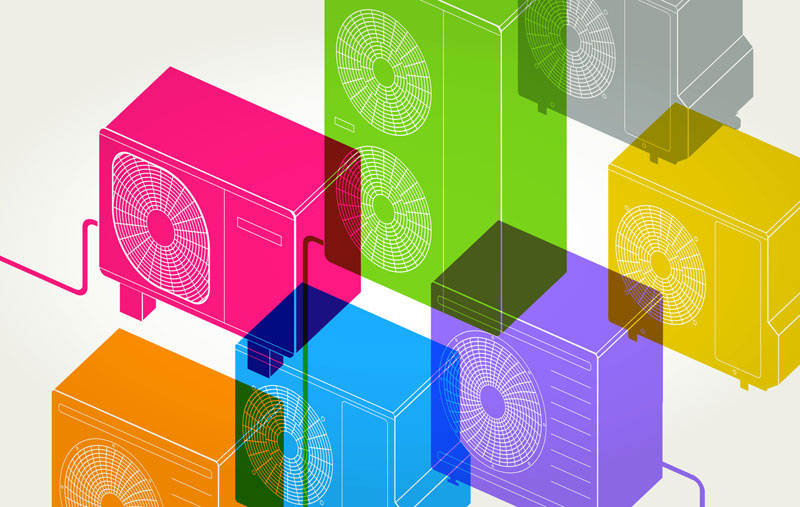It seems that heat pump technology is changing faster than the weather, which is good since we live in Colorado and know how important it is to deal the most effectively with our freaky forecasts.
But if you’re considering a heat pump for your central HVAC system or mini splits for spot heating and cooling, the many new and emerging choices can be a little overwhelming, especially when considering what can be a big investment.
That’s where the pros at Allstar Electrical Services can help.
Here’s a look at what’s out there now and what’s coming to help you make your best choice.
Will You Want Ducted or Ductless?
Choosing the right heat pump first depends on how you plan to use it.
Do you want a ducted whole-house system that uses your existing (or planned) ductwork and replaces your existing components? That will take a larger, higher-capacity heat pump.
Or do you want to heat and/or cool a specific area like a shed, an auxiliary dwelling, or single room?
Then a ductless mini split fits the bill, both functionally and economically. Mini splits can also be used to replace room radiators when the expense and hassle of installing ductwork argues against it.
What Thermal Energy Source Will You Use?
All heat pumps are appliances and consume electricity, but they get their heating and cooling energy from the outside air or another thermal energy source. That eliminates the need to burn fuel or use heating coils, resulting in their much higher efficiency compared to traditional sources. It also eliminates emissions from burning fuels both at the unit and the power plants that supply it.
But some new systems are using things like carbon dioxide and water in their heat exchangers to boost performance or when sufficient outside air is unavailable.
For more information about how air source heat pumps work, see this video on the This Old House YouTube channel.
Because of the essentially endless supply of free outside air, air source heat pumps are the most common type by far. They compress or expand outside air in a heat exchanger to convert cold air to warm and warm air to cold. Since the mechanics and engineering are relatively simple and well known, air source heat pumps are usually the choice when large amounts of air need to be moved such as in whole-house units and most mini-splits.
One other type that uses mostly-free energy is a geothermal heat pump. It uses the earth’s natural heat as its energy source and that’s essentially free, but tapping it can be an expensive proposition. The tradeoff is that the ground temperature is much more consistent a few feet below the surface, so the heat pump works more efficiently. Even then, the drilling and plumbing can get expensive, so geothermal heat pumps work best for locations with extreme temperatures and fluctuations and larger commercial installations.
Absorption heat pumps are, in effect, air-source heat pumps. But there's an important difference: They're not powered by electricity but by another heat source such as gas or solar-heated water. When used in residential buildings, these heat pumps utilize an ammonia-water absorption cycle for heating and cooling.
These are less common than other types of heat pumps. Check with your installer and with an accountant to verify if they'll qualify for federal and local tax credits before making a decision.
Comparing Types of Heat Pumps
The costs of a heat pump’s equipment and installation will depend on factors like square footage, ducting, and insulation. On average, though, according to data from the American Society of Home Inspectors (ASHI), a typical heat pump system will run around $5,50. But note that your state and city may have additional programs to help lower purchase and installation costs. For information on programs available to Colorado residents, see this article on the Allstar website.
For an idea of the cost and federal incentives of various heat pump systems, the ASHI has put this table together as a guide. The costs exclude any needed ductwork, structural or special electrical work, or permits.
Comparative Cost of Heat Pumps
Type |
Description |
Typical cost |
Federal tax incentive |
||
|
Air-source (ducted) |
Uses ambient air temperature to cool and heat |
|
|
||
|
Air-source (ductless) |
Uses head units, or mini splits, to cool and heat |
|
Up to 30% of cost |
||
|
Geothermal |
|
$6,000–$20,000 |
|
||
|
Absorption |
Uses a source other than electricity to run -- typically, gas or solar-heated water |
$4,000–$8,000 |
Potentially up to 30% of cost |
For more information on the programs available in Colorado, see this article on the Allstar Electrical Services website.
Let Allstar Help You Get the Best Bang for Your Buck
Going electric can be complicated and expensive. Your electrical service may need upgrading along with extra wiring to support the added loads. If not done carefully, it can cost more than money—it can pose serious risks to both your property and the precious things it houses.
If you’re considering investing in heat pumps, adding an EV charging station, or switching to electric appliances, let Allstar Electrical Services help you assess the costs and benefits of such a move.
Give us a call at 303.399.7420 or visit our website. We’re top-rated by the Better Business Bureau and a preferred contractor by Angi’s Home Advisor.
The pros at Allstar Electrical Services look forward to serving your total electrical needs in 2024 and for many years to come.


